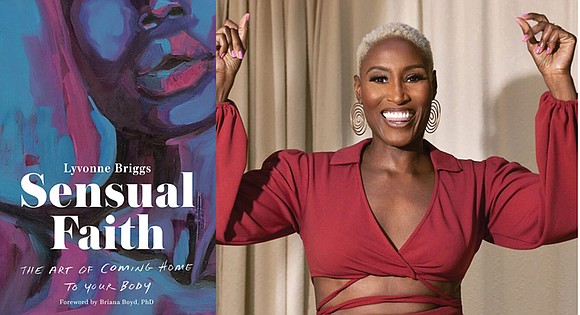A Black preacher, ‘no longer at war with her body,’ on connecting flesh with the divine
Emma Ryan/Religion News Service | 6/22/2023, 6 p.m.

Lyvonne Briggs describes herself as “a Black woman spiritual leader who is no longer at war with her body.” Her mission, in her new book, “Sensual Faith,” is to help other women stop being at war with their bodies too.
If that sounds dark, that misapprehension is dispelled in the first words of “Sensual Faith”: “Hey Boo!” Pastor Briggs addresses her readers as if they were in the room with her, and her enthusiasm rarely wanes over the course of 200 pages as she talks about pain and pleasure, healing, hurting and how our bodies are connected with the divine.
Pastor Briggs, 40, says she does not preach about anything she hasn’t personally experienced — the roller coaster of marriage and divorce, conception and miscarriage. She writes about surviving sexual assault. A New Yorker, Pastor Briggs attended Yale Divinity School and Columbia Theological Seminary. She worked as an assistant pastor in New Orleans before founding Beautiful Scars, a storytelling and personal development consultancy.
Religion News Service spoke with Pastor Briggs about her audience, her journey and the act of spiritual, sensual and sexual healing.
RNS: The voice you use in the book is unexpected but refreshing. How did you decide to write it this way?
Pastor Briggs: I’m a Black woman writing for Black wom- en, and Black women have vernacular, colloquialisms and an energy about us. There’s very Black girl-specific language — even, in some parts, very Black church girl-specific language — that I use intentionally because
I wanted Black women to know that, one, I’m writing to you. That we can carve out this re- ally beautiful, authentic, sacred space together to explore really big, hard, tough issues. There’s something to be said about writing a book about radical hospitality using language that’s a tool and an invitation into said radical hospitality.
RNS: So you’re writing primarily for Black women?
Pastor Briggs: In my mind’s eye, I’m talking to Black women, 18 to 45, currently or formerly “churched,” who always had this hunch that there’s got to be more to it than this — religion, faith, God, spirituality. Growing up hearing sermons about, “If you have sex before marriage, you’re going to hell.” Why I gotta go to hell if I’m having consensual sex? There are harmful ideologies that attack our queer kin, right? Why I gotta hate gay people if I love God? That doesn’t make sense.
When I think of specific readers, I’m thinking of women, like me, in their 20s, in grad school, being introduced to new concepts and thinking, “I really want to go to a yoga class, but I heard yoga is demonic. Can I go to yoga or not?” Women in their 30s navigating engagements, marriage, divorce, all kinds of reproductive health things. I’m thinking of women in their 40s navigating divorce and owning their sexuality now that they’re thinking about life after the kids leave the nest.
It’s for women who want to feel full, whole, at ease and at home in their bodies, no matter what age they’re at.
RNS: What does “sensual faith” mean to you?
Pastor Briggs: It’s a framework that’s been in the making for decades. No matter where I was in life, at home, church, school, questions about my being and my experience would always come up. There would be walls put up, whether it was in the classroom or the sanctuary, when I wanted to talk about really hard things. I started to learn that the things the church was teaching me were bad, or evil or demonic, were what I needed to be at home in my body. I realized that when I felt comfortable in my power, that was a problem for the church and for society.
RNS: You write about recovering from sexual assault and that the church told you “It’s in God’s plan” or “The Lord is testing you.” What should they have said?
Pastor Briggs: “I believe you.” It boggles my mind as a pastor, that there are people who will believe that God split open the Red Sea, a prophet survived an encounter with a whale, but when a person comes forward about assault, they don’t believe that. All of the rationalization goes out the window the moment I honor and see you. “I believe you” says: “You don’t have to prove here, you’re not on trial. I support you, I may not know how to support you, but I’m gonna figure it out.”






